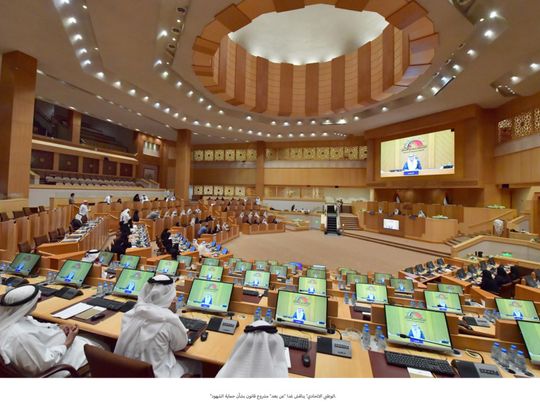
Abu Dhabi: A member of the Federal National Council (FNC) on Tuesday will put a question to Abdulhamid Saeed, Central Bank Governor, on why certain banks have failed to provide COVID-19 relief packages, including postponement of loan instalments.
“Many citizens have complained that their banks refused to postpone their loan instalments, which is unacceptable particularly as the Central Bank announced stimulus worth tens of billions of dirhams that included aid to the banking system,” Hamad Al Rahoumi, First Deputy Speaker of the House, told Gulf News.

The UAE Central Bank said last month it has doubled to $70 billion a stimulus package to support the country’s economy amid the coronavirus pandemic.
“The aggregate value of all capital and liquidity measures adopted by the CBUAE since March 14 has reached Dh256 billion ($70 billion),” the central bank said.
In March, UAE announced a stimulus worth $35 billion that included aid to the banking system, facilities for loans and injecting of funds into the bourses.
Al Rahoumi said he will demand a clarification on why some banks failed to assume their social responsibility towards citizens and residents when most of the new measures focused on easing financial and liquidity requirements for banks to free up cash for lending.
In the new measures, the central bank reduced by half to 7 per cent the reserves banks are required to keep for demand deposits, which can be withdrawn by clients anytime.
This will allow for some $16.6 billion in liquidity to be used in new bank lending, the central bank said.
Al Rahoumi added the regulator’s new measures also allow banks to defer payment of loans for companies and clients until the end of 2020.
“The central bank’s measures should effectively enable banks to offer the required relief and funding for households whose income are heavily impacted,” the member said.
The House will also discuss a draft law on public health.
Marwan Obaid Ali Al Muhairi, a member from Ajman, will put a question to Obaid Huamid Al Tayer, Minister of State for Financial Affairs, on the role of the Al Etihad Credit Bureau in verifying financial liabilities of individuals and businesses, locally and internationally.
As far as social effects of COVID-19 are concerned, the UAE is a highly organised, well-funded, technologically advanced and cooperative society. This greatly increases the likelihood that the radical measures being employed to counteract the highly contagious strain will succeed in slowing its spread.
The speed at which the country has moved to disinfect public spaces, as well as installing thermal cameras, banning Shisha, postponing large gatherings, shuttering educational establishments and restricting prayer times, augurs well for containment.








